Xiachong Feng
PERSONA: Dynamic and Compositional Inference-Time Personality Control via Activation Vector Algebra
Feb 17, 2026Abstract:Current methods for personality control in Large Language Models rely on static prompting or expensive fine-tuning, failing to capture the dynamic and compositional nature of human traits. We introduce PERSONA, a training-free framework that achieves fine-tuning level performance through direct manipulation of personality vectors in activation space. Our key insight is that personality traits appear as extractable, approximately orthogonal directions in the model's representation space that support algebraic operations. The framework operates through three stages: Persona-Base extracts orthogonal trait vectors via contrastive activation analysis; Persona-Algebra enables precise control through vector arithmetic (scalar multiplication for intensity, addition for composition, subtraction for suppression); and Persona-Flow achieves context-aware adaptation by dynamically composing these vectors during inference. On PersonalityBench, our approach achieves a mean score of 9.60, nearly matching the supervised fine-tuning upper bound of 9.61 without any gradient updates. On our proposed Persona-Evolve benchmark for dynamic personality adaptation, we achieve up to 91% win rates across diverse model families. These results provide evidence that aspects of LLM personality are mathematically tractable, opening new directions for interpretable and efficient behavioral control.
Proxy Compression for Language Modeling
Feb 04, 2026Abstract:Modern language models are trained almost exclusively on token sequences produced by a fixed tokenizer, an external lossless compressor often over UTF-8 byte sequences, thereby coupling the model to that compressor. This work introduces proxy compression, an alternative training scheme that preserves the efficiency benefits of compressed inputs while providing an end-to-end, raw-byte interface at inference time. During training, one language model is jointly trained on raw byte sequences and compressed views generated by external compressors; through the process, the model learns to internally align compressed sequences and raw bytes. This alignment enables strong transfer between the two formats, even when training predominantly on compressed inputs which are discarded at inference. Extensive experiments on code language modeling demonstrate that proxy compression substantially improves training efficiency and significantly outperforms pure byte-level baselines given fixed compute budgets. As model scale increases, these gains become more pronounced, and proxy-trained models eventually match or rival tokenizer approaches, all while operating solely on raw bytes and retaining the inherent robustness of byte-level modeling.
Fine-Mem: Fine-Grained Feedback Alignment for Long-Horizon Memory Management
Jan 13, 2026Abstract:Effective memory management is essential for large language model agents to navigate long-horizon tasks. Recent research has explored using Reinforcement Learning to develop specialized memory manager agents. However, existing approaches rely on final task performance as the primary reward, which results in severe reward sparsity and ineffective credit assignment, providing insufficient guidance for individual memory operations. To this end, we propose Fine-Mem, a unified framework designed for fine-grained feedback alignment. First, we introduce a Chunk-level Step Reward to provide immediate step-level supervision via auxiliary chunk-specific question answering tasks. Second, we devise Evidence-Anchored Reward Attribution to redistribute global rewards by anchoring credit to key memory operations, based on the specific memory items utilized as evidence in reasoning. Together, these components enable stable policy optimization and align local memory operations with the long-term utility of memory. Experiments on Memalpha and MemoryAgentBench demonstrate that Fine-Mem consistently outperforms strong baselines, achieving superior success rates across various sub-tasks. Further analysis reveals its adaptability and strong generalization capabilities across diverse model configurations and backbones.
Causal Tracing of Object Representations in Large Vision Language Models: Mechanistic Interpretability and Hallucination Mitigation
Nov 19, 2025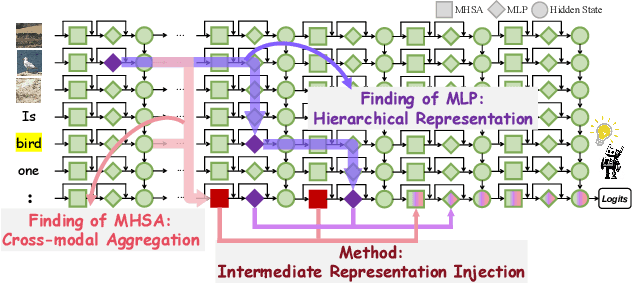

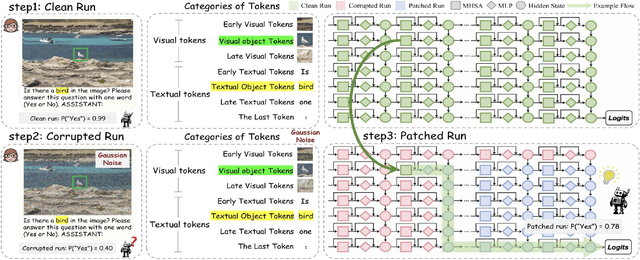
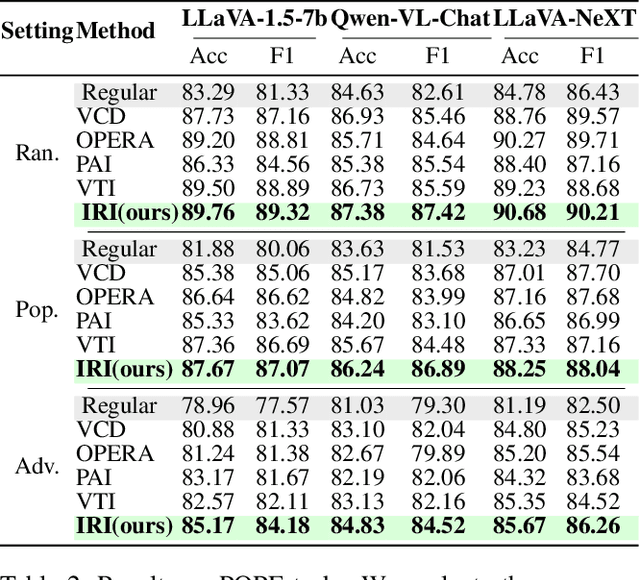
Abstract:Despite the remarkable advancements of Large Vision-Language Models (LVLMs), the mechanistic interpretability remains underexplored. Existing analyses are insufficiently comprehensive and lack examination covering visual and textual tokens, model components, and the full range of layers. This limitation restricts actionable insights to improve the faithfulness of model output and the development of downstream tasks, such as hallucination mitigation. To address this limitation, we introduce Fine-grained Cross-modal Causal Tracing (FCCT) framework, which systematically quantifies the causal effects on visual object perception. FCCT conducts fine-grained analysis covering the full range of visual and textual tokens, three core model components including multi-head self-attention (MHSA), feed-forward networks (FFNs), and hidden states, across all decoder layers. Our analysis is the first to demonstrate that MHSAs of the last token in middle layers play a critical role in aggregating cross-modal information, while FFNs exhibit a three-stage hierarchical progression for the storage and transfer of visual object representations. Building on these insights, we propose Intermediate Representation Injection (IRI), a training-free inference-time technique that reinforces visual object information flow by precisely intervening on cross-modal representations at specific components and layers, thereby enhancing perception and mitigating hallucination. Consistent improvements across five widely used benchmarks and LVLMs demonstrate IRI achieves state-of-the-art performance, while preserving inference speed and other foundational performance.
LangGPS: Language Separability Guided Data Pre-Selection for Joint Multilingual Instruction Tuning
Nov 13, 2025Abstract:Joint multilingual instruction tuning is a widely adopted approach to improve the multilingual instruction-following ability and downstream performance of large language models (LLMs), but the resulting multilingual capability remains highly sensitive to the composition and selection of the training data. Existing selection methods, often based on features like text quality, diversity, or task relevance, typically overlook the intrinsic linguistic structure of multilingual data. In this paper, we propose LangGPS, a lightweight two-stage pre-selection framework guided by language separability which quantifies how well samples in different languages can be distinguished in the model's representation space. LangGPS first filters training data based on separability scores and then refines the subset using existing selection methods. Extensive experiments across six benchmarks and 22 languages demonstrate that applying LangGPS on top of existing selection methods improves their effectiveness and generalizability in multilingual training, especially for understanding tasks and low-resource languages. Further analysis reveals that highly separable samples facilitate the formation of clearer language boundaries and support faster adaptation, while low-separability samples tend to function as bridges for cross-lingual alignment. Besides, we also find that language separability can serve as an effective signal for multilingual curriculum learning, where interleaving samples with diverse separability levels yields stable and generalizable gains. Together, we hope our work offers a new perspective on data utility in multilingual contexts and support the development of more linguistically informed LLMs.
Adaptive Backtracking for Privacy Protection in Large Language Models
Aug 08, 2025Abstract:The preservation of privacy has emerged as a critical topic in the era of artificial intelligence. However, current work focuses on user-oriented privacy, overlooking severe enterprise data leakage risks exacerbated by the Retrieval-Augmented Generation paradigm. To address this gap, our paper introduces a novel objective: enterprise-oriented privacy concerns. Achieving this objective requires overcoming two fundamental challenges: existing methods such as data sanitization severely degrade model performance, and the field lacks public datasets for evaluation. We address these challenges with several solutions. (1) To prevent performance degradation, we propose ABack, a training-free mechanism that leverages a Hidden State Model to pinpoint the origin of a leakage intention and rewrite the output safely. (2) To solve the lack of datasets, we construct PriGenQA, a new benchmark for enterprise privacy scenarios in healthcare and finance. To ensure a rigorous evaluation, we move beyond simple static attacks by developing a powerful adaptive attacker with Group Relative Policy Optimization. Experiments show that against this superior adversary, ABack improves the overall privacy utility score by up to 15\% over strong baselines, avoiding the performance trade-offs of prior methods.
ScienceBoard: Evaluating Multimodal Autonomous Agents in Realistic Scientific Workflows
May 26, 2025



Abstract:Large Language Models (LLMs) have extended their impact beyond Natural Language Processing, substantially fostering the development of interdisciplinary research. Recently, various LLM-based agents have been developed to assist scientific discovery progress across multiple aspects and domains. Among these, computer-using agents, capable of interacting with operating systems as humans do, are paving the way to automated scientific problem-solving and addressing routines in researchers' workflows. Recognizing the transformative potential of these agents, we introduce ScienceBoard, which encompasses two complementary contributions: (i) a realistic, multi-domain environment featuring dynamic and visually rich scientific workflows with integrated professional software, where agents can autonomously interact via different interfaces to accelerate complex research tasks and experiments; and (ii) a challenging benchmark of 169 high-quality, rigorously validated real-world tasks curated by humans, spanning scientific-discovery workflows in domains such as biochemistry, astronomy, and geoinformatics. Extensive evaluations of agents with state-of-the-art backbones (e.g., GPT-4o, Claude 3.7, UI-TARS) show that, despite some promising results, they still fall short of reliably assisting scientists in complex workflows, achieving only a 15% overall success rate. In-depth analysis further provides valuable insights for addressing current agent limitations and more effective design principles, paving the way to build more capable agents for scientific discovery. Our code, environment, and benchmark are at https://qiushisun.github.io/ScienceBoard-Home/.
From Hypothesis to Publication: A Comprehensive Survey of AI-Driven Research Support Systems
Mar 03, 2025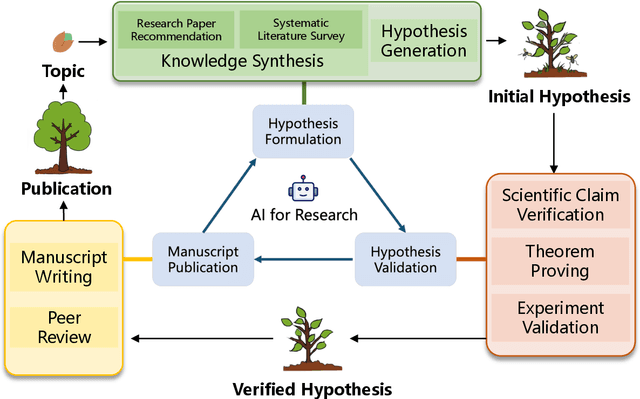
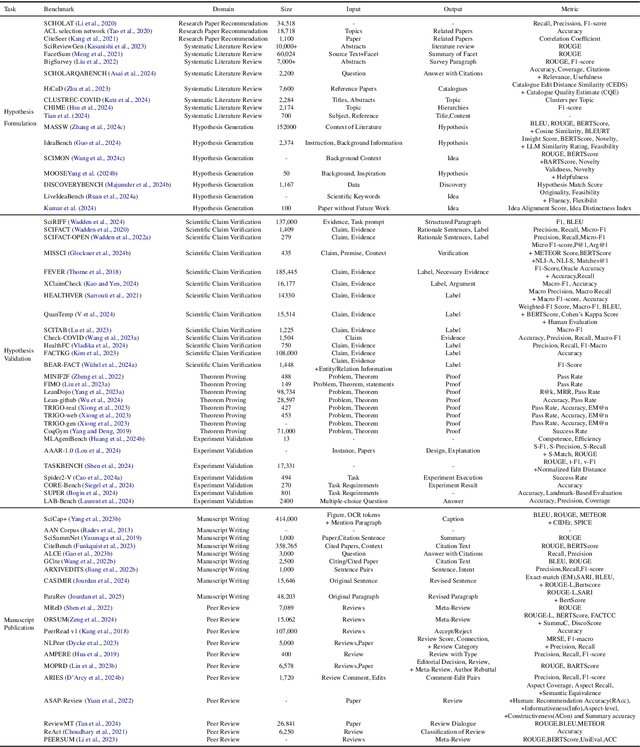

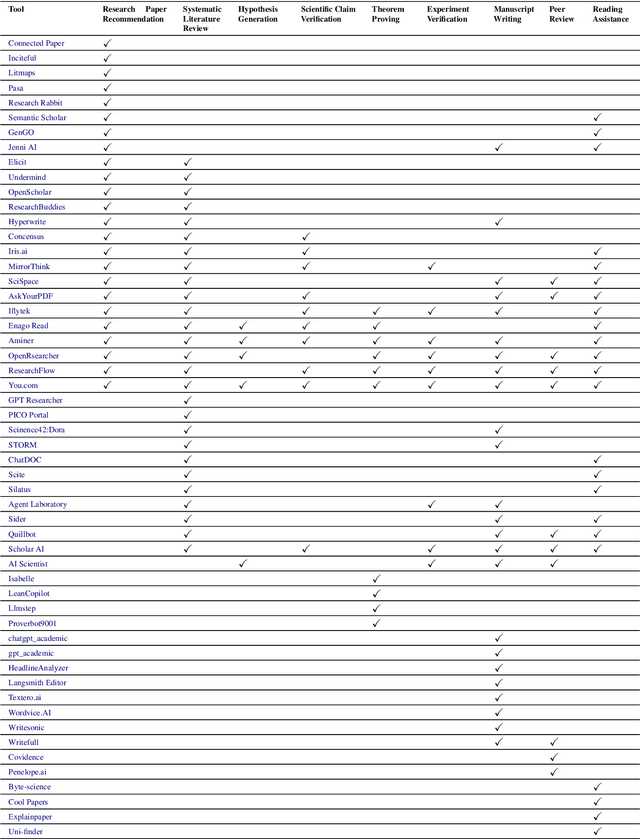
Abstract:Research is a fundamental process driving the advancement of human civilization, yet it demands substantial time and effort from researchers. In recent years, the rapid development of artificial intelligence (AI) technologies has inspired researchers to explore how AI can accelerate and enhance research. To monitor relevant advancements, this paper presents a systematic review of the progress in this domain. Specifically, we organize the relevant studies into three main categories: hypothesis formulation, hypothesis validation, and manuscript publication. Hypothesis formulation involves knowledge synthesis and hypothesis generation. Hypothesis validation includes the verification of scientific claims, theorem proving, and experiment validation. Manuscript publication encompasses manuscript writing and the peer review process. Furthermore, we identify and discuss the current challenges faced in these areas, as well as potential future directions for research. Finally, we also offer a comprehensive overview of existing benchmarks and tools across various domains that support the integration of AI into the research process. We hope this paper serves as an introduction for beginners and fosters future research. Resources have been made publicly available at https://github.com/zkzhou126/AI-for-Research.
Reasoning Does Not Necessarily Improve Role-Playing Ability
Feb 24, 2025Abstract:The application of role-playing large language models (LLMs) is rapidly expanding in both academic and commercial domains, driving an increasing demand for high-precision role-playing models. Simultaneously, the rapid advancement of reasoning techniques has continuously pushed the performance boundaries of LLMs. This intersection of practical role-playing demands and evolving reasoning capabilities raises an important research question: "Can reasoning techniques enhance the role-playing capabilities of LLMs?" To address this, we conduct a comprehensive study using 6 role-playing benchmarks, 24 LLMs, and 3 distinct role-playing strategies, comparing the effectiveness of direct zero-shot role-playing, role-playing with Chain-of-Thought (CoT), and role-playing using reasoning-optimized LLMs. Our findings reveal that CoT may reduce role-playing performance, reasoning-optimized LLMs are unsuitable for role-playing, reasoning ability disrupts the role-playing scaling law, large models still lack proficiency in advanced role-playing, and Chinese role-playing performance surpasses English role-playing performance. Furthermore, based on extensive experimental results, we propose two promising future research directions: Role-aware CoT for improving role-playing LLMs and Reinforcement Learning for role-playing LLMs, aiming to enhance the adaptability, consistency, and effectiveness of role-playing LLMs for both research and real-world applications.
Sailor2: Sailing in South-East Asia with Inclusive Multilingual LLMs
Feb 18, 2025
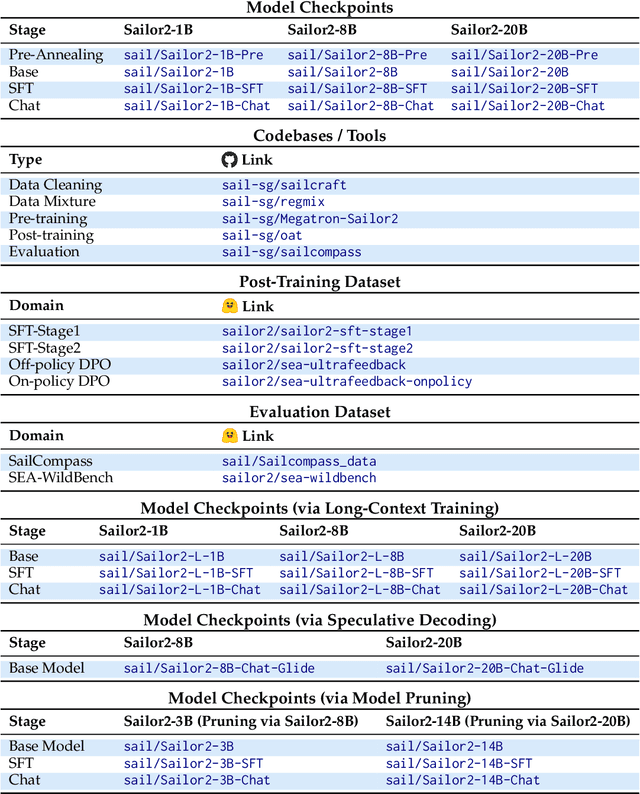
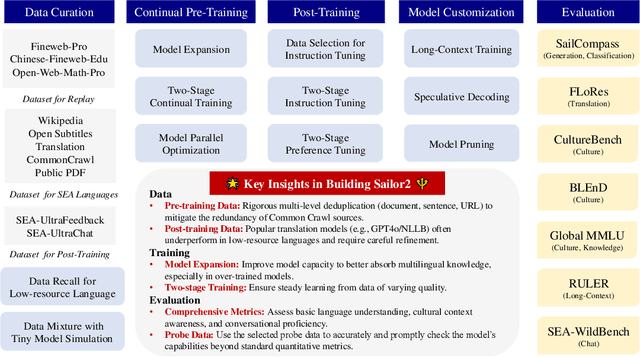
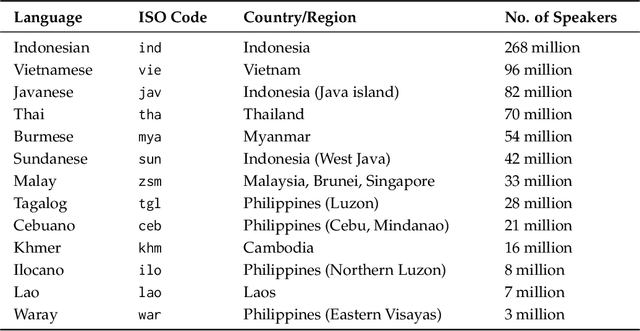
Abstract:Sailor2 is a family of cutting-edge multilingual language models for South-East Asian (SEA) languages, available in 1B, 8B, and 20B sizes to suit diverse applications. Building on Qwen2.5, Sailor2 undergoes continuous pre-training on 500B tokens (400B SEA-specific and 100B replay tokens) to support 13 SEA languages while retaining proficiency in Chinese and English. Sailor2-20B model achieves a 50-50 win rate against GPT-4o across SEA languages. We also deliver a comprehensive cookbook on how to develop the multilingual model in an efficient manner, including five key aspects: data curation, pre-training, post-training, model customization and evaluation. We hope that Sailor2 model (Apache 2.0 license) will drive language development in the SEA region, and Sailor2 cookbook will inspire researchers to build more inclusive LLMs for other under-served languages.
 Add to Chrome
Add to Chrome Add to Firefox
Add to Firefox Add to Edge
Add to Edge